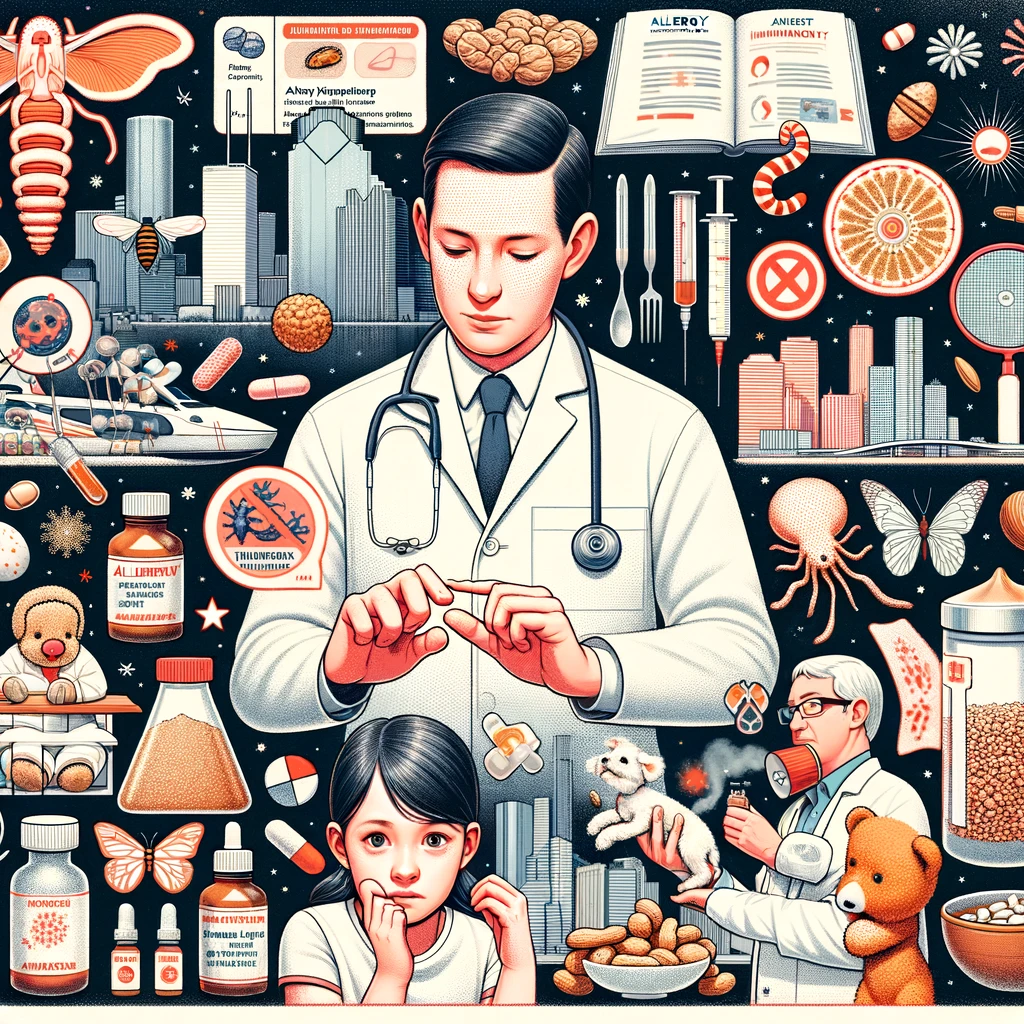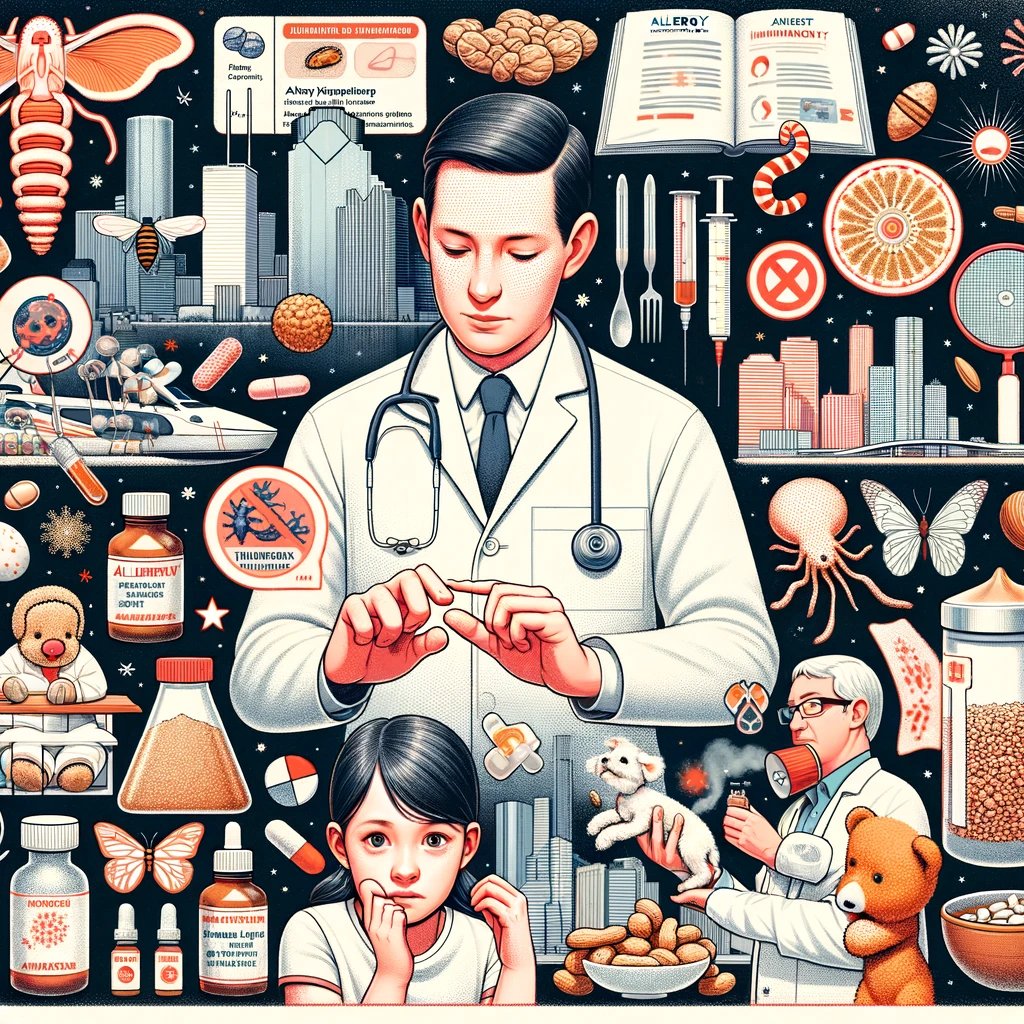3. Are there any natural remedies that can help with allergies?
While medication is often the mainstay of allergy management, some natural remedies may offer additional relief. These could include nasal saline irrigation, air purifiers, or dietary modifications. However, discussing these with your allergist is crucial to ensure they won't interfere with your medications or worsen your condition.
4. Is allergy testing necessary, and what does it involve?
Allergy testing can be a valuable tool for identifying your specific allergens. Skin prick tests involve placing small amounts of potential allergens on your skin and observing for reactions. Blood tests can also diagnose allergies. While not always necessary, allergy testing can significantly improve your understanding of your allergies and guide treatment plans.
5. I have [symptoms], could they be allergies?
Common allergy symptoms include sneezing, runny or stuffy nose, itchy eyes, skin rash, coughing, wheezing, and fatigue. However, other conditions can cause similar symptoms. An allergist will consider your entire medical history and thoroughly examine it to determine if allergies are the culprit.
6. What can I do to avoid allergy triggers in my environment?
Once you know your triggers, implementing environmental allergy avoidance strategies is critical. Here are some tips depending on your allergies:
- Pollen: Limit outdoor activity on high pollen count days, keep windows closed, and use air purifiers.
- Dust mites: Wash bedding in hot water weekly, vacuum regularly with a HEPA filter, and encase mattresses and pillows in allergy-proof covers.
- Pet dander: Bathe pets regularly, keep them off furniture, and dedicate a pet-free zone in your home.
- Mold: Address any moisture issues in your home, control humidity levels, and clean moldy surfaces promptly.
7. Can allergies be cured?
While there's no permanent cure for most allergies, effective treatments like allergy medications and immunotherapy (allergy shots) can significantly control symptoms and improve your quality of life. Sometimes, food allergies may be outgrown with time, but consult your allergist for specific guidance.
8. Is there a link between allergies and asthma?
Yes, there is a strong link between allergies and asthma. Many people with allergies also have asthma, which affects the airways, causing wheezing, shortness of breath, and chest tightness.
9. I'm allergic to [allergen]; what foods should I avoid?
If you have a food allergy, your allergist will provide a detailed list of foods to avoid and may recommend carrying an epinephrine auto-injector (EpiPen) in case of accidental exposure.
10. Is it safe to get allergy shots during pregnancy?
Allergy shots during pregnancy require careful consideration by your allergist and obstetrician, but they can usually be continued while pregnant. They are also okay to continue while breastfeeding.
Food Allergies: Specific Concerns for Houston Foodies
11. My child has a food allergy; how can I keep them safe?
Having a child with a food allergy can be a source of worry for any parent in Houston, especially with a city known for its diverse and sometimes unpredictable food offerings. But fear not! Here's how to address question 11 and ensure your child's safety:
Open Communication is Key
- Talk to your child's allergist: Discuss the specifics of your child's allergy, including the severity of reactions, triggers, and emergency protocol.
- Educate your child: Age-appropriately explain their allergies, the foods to avoid, and the importance of clear communication. As they grow older, empower them to advocate for themselves and ask questions when unsure about food ingredients.
- Communicate with caregivers: Inform schools, daycare centers, babysitters, and other caregivers about your child's allergies. Provide a detailed allergy action plan outlining the specific allergens, symptoms, and emergency procedures.
Food Labeling and School Protocols
- Become a label-reading pro: Always meticulously read food labels with your child, looking for the eight major food allergens listed in bold ("milk," "eggs," "peanuts," "tree nuts," "soy," "wheat," "fish," "shellfish"). Ask questions at restaurants or bakeries if you need clarification on ingredients or potential cross-contamination risks.
- Partner with your child's school: Work with the school nurse and teachers to develop a personalized allergy management plan. This might include access to a safe space for your child to eat allergen-free lunches, clear communication with classmates about food allergies, and a designated staff member trained to administer emergency medication if needed.
Empowering Your Child
- Practice saying "no": Role-play scenarios in which your child politely declines food from friends or classmates. This will help them build the confidence to advocate for themselves and avoid potential allergens.
- Pack safe snacks: If other options aren't suitable, encourage your child to carry safe and healthy snacks to school or outings.
- Celebrate safe choices: Reinforce your child's responsible behavior when they make safe food choices. Celebrate their awareness and proactive approach to managing their allergies.
Additional Tips for Houston Parents
- Consider allergy awareness programs: Enroll your child in educational programs about food allergies and self-management strategies.
- Connect with support groups: Seek out online or in-person support groups connecting parents of children with food allergies. Share experiences, ask questions, and find comfort in a community that understands your concerns.
12. What are the different types of food allergies?
There are two main types of food allergies:
- IgE-mediated allergies are the most common, involving the immune system protein immunoglobulin E (IgE). When you ingest the allergen, your immune system overreacts, causing symptoms like hives, swelling, difficulty breathing, and even anaphylaxis (a life-threatening reaction). Common IgE-mediated food allergies include peanuts, tree nuts, milk, eggs, soy, wheat, fish, shellfish, and sesame.
- Non-IgE-mediated allergies: These allergies don't involve IgE but can still cause unpleasant reactions, often hours or days after consuming the food. Symptoms may include stomach cramps, diarrhea, nausea, vomiting, or eczema flare-ups. Examples include lactose intolerance (the inability to digest milk sugar) and gluten sensitivity (a reaction to the gluten protein in wheat, barley, and rye).
13. Can I outgrow my food allergy?
There's good news! Some children with milk or egg allergies may outgrow them by adolescence. However, allergies to peanuts, tree nuts, fish, and shellfish are more likely to be lifelong. Your allergist can monitor your allergies through regular testing and advise on the possibility of outgrowing them.
14. What should I do if I experience a severe allergic reaction (anaphylaxis)?
It could be anaphylaxis if you experience symptoms like sudden trouble breathing, wheezing, swelling of the face or throat, dizziness, or rapid heartbeat. Seek immediate medical attention by calling 911 or proceeding to the nearest emergency room.
Here are some additional tips regarding food allergies:
- Always carry an epinephrine auto-injector (EpiPen) if prescribed by your allergist. This medication can be lifesaving in case of a severe allergic reaction.
- Meticulously read food labels. The U.S. Food and Drug Administration (FDA) requires manufacturers to list the eight major food allergens (milk, eggs, peanuts, tree nuts, soy, wheat, fish, and shellfish) on food labels. Look for "may contain" statements to identify potential cross-contamination risks.
- Inform restaurants and friends about your allergies. Communicate your allergies when dining out and discuss potential risks with the chef or server. Educate friends and family about your allergies and how they can help in case of accidental exposure.
By understanding the different types of food allergies, the possibility of outgrowing them, and how to manage severe reactions, you can confidently navigate Houston's culinary landscape and enjoy delicious food safely.
Skin Allergies: Itching for Answers
15. I have a rash; could it be an allergy?
Skin rashes can have various causes, including allergies, eczema, and infections. Your allergist will assess the rash's location, appearance, and other symptoms to determine the underlying cause.
16. What is the difference between eczema and allergies?
Eczema is a chronic inflammatory skin condition that can cause itchy, red, and scaly patches. Allergies can trigger eczema flares, but they are not the same. Your allergist can help differentiate between the two and recommend appropriate treatment.
17. What are the best treatments for hives?
Hives are raised, itchy welts that appear suddenly on the skin. Allergies, medications, infections, or other causes can trigger them. Antihistamines are the mainstay of treatment for hives, and in some cases, more specialized therapy might be needed.
The Immunology Side: Beyond Allergies
18. I get sick often; could it be a problem with my immune system?
Frequent illnesses could indicate an underlying immune system dysfunction. Your allergist/immunologist can assess your immune system's function through tests and recommend strategies to boost your body's natural defenses.
19. What vaccines do you recommend for adults/children?
Vaccines are crucial for maintaining good immune health. Your allergist or immunologist can review your immunization history and recommend age-appropriate vaccinations to protect you from preventable diseases.
20. I have a chronic health condition; can an immunologist help?
Immunologists specialize in diagnosing and treating disorders related to the immune system, specifically immunodeficiencies. If you have a chronic health condition suspected to involve the immune system, an allergist/immunologist can be a valuable partner in your healthcare journey.
Taking Charge of Your Health: A Final Word from Houston ENT & Allergy
Living with allergies or immune system concerns doesn't have to limit your life in Houston. By working with a qualified allergist/immunologist, you can better understand your condition, develop an effective management plan, and explore treatment options to improve your quality of life.
Remember, knowledge is power, and asking questions is the first step toward taking charge of your health. So, breathe easy, explore Houston's vibrant offerings, and let your allergist/immunologist be your partner in navigating allergies and keeping your immune system strong.


